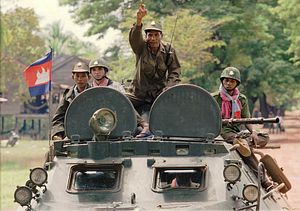When Cambodia’s main opposition party was forcibly dissolved in 2017, the words “death of democracy” splashed across the front page of the Phnom Penh Post. At the time it seemed appropriate. The pre-election disbandment of the Cambodia National Rescue Party (CNRP) gave the ruling party all 125 seats in the National Assembly and transformed Cambodia into a de facto one-party state.
But on the anniversary of the July 1997 violent clashes – usually referred to as a coup – one must ask if democracy was ever alive in Cambodia to begin with.
For Lee Morgenbesser, a regional expert on authoritarianism, democracy never took hold in Cambodia despite the United Nation’s lackluster attempt to implant it.
“The best opportunity for democracy to flourish in Cambodia was under the United Nations Transitional Authority in Cambodia [UNTAC] during the early 1990s. It is well known that the intervention force made several critical mistakes, such as failing to disarm all military and paramilitary forces as well as failing to establish a procedure for the transfer of power after the 1993 election,” he said in a recent email.
UNTAC took control of the country after the Vietnamese overthrew the ultra-Maoist Khmer Rouge, which killed nearly two million people in the 1970s. Vietnam installed a puppet government that included Hun Sen and Heng Samrin – today’s prime minister and National Assembly president. UNTAC was meant to guide Cambodia into a new era of democracy, but in the end it more resembled a simple electoral body.
In the 1993 UNTAC-organized election, the royalist Funcinpec party received the most votes, but was three seats short of an outright majority, while Hun Sen’s Cambodian People’s Party (CPP) came second. As the UN packed up and left town, the CPP leveraged its greater military strength into forcing Funcinpec to agree to a highly controversial power-sharing framework.
Despite losing the election, Hun Sen, one of Vietnam’s undemocratically installed leaders, became “co-prime minister,” while the CPP was allowed to nominate cabinet members and ministers.
In July 1997, Hun Sen’s militarized political party launched an offensive, surrounding Funcinpec party garrisons and demanding that they turn over their weapons.
“I and many of my colleagues at the UN human rights office had the unforgettable experience of digging up the bodies of men stripped naked to their underwear, handcuffed behind their backs, blindfolded, and shot in the head,” wrote Brad Adams, current director of Human Rights Watch’s Asia division, in his 2007 report on the events of the coup.
Adams traced the coup back to the flawed power-sharing formula that saw Funcinpec relegated to “second-class status,” the imminent electoral alliance between Funcinpec and popular emerging politician Sam Rainsy, and Hun Sen’s desire for absolute personal power after factions within his own party challenged him.
Rainsy, who would go on to found the CNRP, was himself targeted by a grenade attack that he barely survived just months before the coup.
David Chandler, a pre-eminent historian on modern Cambodia, agreed that the events were a coup.
“Certainly Funcinpec was removed from power by what happened, and since they were supposedly half the government, it was a coup,” he said in a recent email.
Both Adams and Chandler admit that Funcinpec was importing weapons and holding talks with Khmer Rouge soldiers, but Hun Sen was doing the same thing at the same time. By July 1997, it was clear to all parties that only the CPP was powerful enough to win an outright confrontation.
On July 4, fearing for his life, Funcinpec President Prince Ranariddh fled to France. The very next day, CPP forces loyal to Hun Sen struck, defeating Funcinpec in two days before beginning a campaign of extrajudicial executions.
In 2007, Adams wrote that the coup “shattered all illusions that the country was on the path to democracy.”
“No one now believes (as a few did at the time), for example, that if an opposition party obtained more votes than the CPP that Hun Sen would relinquish power,” he continued.
In the 2017 local commune elections, the CNRP won 43.8 percent of the popular vote, showing Hun Sen that they were capable of winning an election. True to Adams’ prediction, the CNRP was dissolved before it could contest the 2018 national election.
Even Sam Rainsy agrees that the dissolution of the CNRP was more of a continuation of an anti-democratic tradition than the end of democracy itself.
“Democracy has never existed as a full institutional reality in Cambodia,” he said in an email, while maintaining hope that it will one day.
“It’s not within the power of Hun Sen or any other dictator to eradicate a democratic culture,” Rainsy said, adding that the dissolution of the CNRP “delays, but does not prevent, the creation of a democratic system.”
For Morgenbesser, though, nobody is more to blame for the lack of democracy so far in Cambodia than Hun Sen.
“Hun Sen has always considered democracy to be an enemy of his ambitions,” he said.
That much was evident to Adams back in 2007, when Hun Sen ordered tanks into the streets and overturned Cambodia’s first and only truly democratic election with the barrel of a gun.
“The coup, therefore, stole something intangible yet essential: it stole hope from people who had just begun to dare to dream that their future would be decided by the ballot instead of the bullet,” he wrote.
Adams’ words, pessimistic though they are, continue to ring true in Cambodia’s modern era. In 2016, just days after the 19th anniversary of Hun Sen’s blood-soaked coup, popular political activist Kem Ley was shot in the back and the head. The assassination, widely believed to be a state-sponsored hit, silenced yet another promising voice and showed Cambodia that little has changed for those who oppose Hun Sen’s totalitarian grip on power.
Andrew Nachemson is a freelance journalist based in Southeast Asia.

































